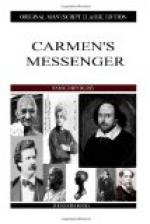HIS COMRADE’S STORY
Foster spent the most part of the next day in the open air with his host. Featherstone had a quiet, genial manner and seemed to have read much, though he held the narrow views that sometimes mark the untraveled Englishman. He appeared to be scrupulously just and showed sound judgment about matters he understood, but he had strong prejudices and Foster did not think him clever. With his rather sensitive pride and fastidiousness he was certainly not the man to make his mark in Canada, and Foster began to understand certain traits of his comrade’s that had puzzled him. Lawrence, although he had keener intelligence, was not quite so fine a type as his father, and in consequence stood rough wear better. But he too, in spite of his physical courage, now and then showed a supine carelessness and tried to avoid, instead of boldly grappling with, things that jarred.
They set out to go shooting, but Featherstone stopped to talk to everybody they met, and showed keen interest in such matters as the turnip crop and the price of sheep. It was clear that he was liked and respected. Sometimes he turned aside to examine tottering gates and blocked ditches, and commented to Foster upon the economics of farming and the burden of taxes. The latter soon gathered that there was not much profit to be derived from a small moorland estate and his host was far from rich. It looked as if it had cost him, and perhaps his family, some self-denial to send the money that had once or twice enabled Lawrence, and Foster with him, to weather a crisis.
At noon they were given a better lunch than Foster had often been satisfied with at a lonely farm, where Featherstone spoke of him as his son’s partner, and seemed to take an ingenuous pride in making it known that Lawrence was prospering. This gave Foster a hint that he acted on later. They, however, shot a brace of partridges in a turnip field, a widgeon that rose from a reedy tarn, and a woodcock that sprang out of a holly thicket in a bog. It was a day of gleams of sunlight, passing showers, and mist that rolled about the hills and swept away, leaving the long slopes in transient brightness, checkered with the green of mosses and the red of withered fern. The sky cleared as they turned homewards, and when they reached the Garth an angry crimson glow spread across the west.
Tea was brought them in the hall and Foster, who had changed his clothes, which was a rare luxury in Canada, sat with much content in a corner by the hearth. He had been out in the raw wind long enough to enjoy the rest and warmth, and the presence of two English ladies added to the charm. Mrs. Featherstone was knitting, but Alice talked to her father about the shooting and what he had noted on the farms. Foster thought her cleverer than the others, but it was obvious that her interest was not forced. She understood agriculture and her remarks were singularly shrewd.




